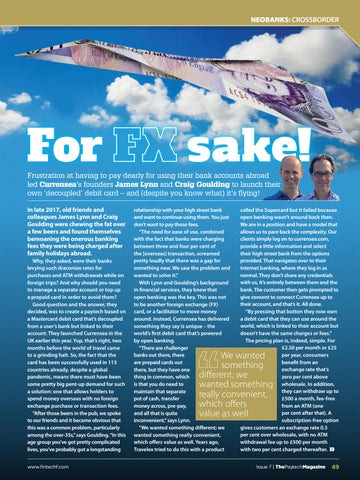NEOBANKS: CROSSBORDER
For FX sake! Frustration at having to pay dearly for using their bank accounts abroad led Currensea’s founders James Lynn and Craig Goulding to launch their own ‘decoupled’ debit card – and (despite you know what) it’s flying! In late 2017, old friends and colleagues James Lynn and Craig Goulding were chewing the fat over a few beers and found themselves bemoaning the onerous banking fees they were being charged after family holidays abroad. Why, they asked, were their banks levying such draconian rates for purchases and ATM withdrawals while on foreign trips? And why should you need to manage a separate account or top up a prepaid card in order to avoid them? Good question and the answer, they decided, was to create a paytech based on a Mastercard debit card that’s decoupled from a user’s bank but linked to their account. They launched Currensea in the UK earlier this year. Yup, that’s right, two months before the world of travel came to a grinding halt. So, the fact that the card has been successfully used in 115 countries already, despite a global pandemic, means there must have been some pretty big pent-up demand for such a solution: one that allows holders to spend money overseas with no foreign exchange purchase or transaction fees. “After those beers in the pub, we spoke to our friends and it became obvious that this was a common problem, particularly among the over-35s,” says Goulding. “In this age group you’ve got pretty complicated lives, you’ve probably got a longstanding www.fintechf.com
relationship with your high street bank and want to continue using them. You just don’t want to pay those fees. “The need for ease of use, combined with the fact that banks were charging between three and four per cent of the [overseas] transaction, screamed pretty loudly that there was a gap for something new. We saw the problem and wanted to solve it.” With Lynn and Goulding’s background in financial services, they knew that open banking was the key. This was not to be another foreign exchange (FX) card, or a facilitator to move money around. Instead, Currensea has delivered something they say is unique – the world’s first debit card that’s powered by open banking. “There are challenger banks out there, there are prepaid cards out there, but they have one thing in common, which is that you do need to maintain that separate pot of cash, transfer money across, pre-pay, and all that is quite inconvenient,” says Lynn. “We wanted something different; we wanted something really convenient, which offers value as well. Years ago, Travelex tried to do this with a product
called the Supercard but it failed because open banking wasn’t around back then. We are in a position and have a model that allows us to pare back the complexity. Our clients simply log on to currensea.com, provide a little information and select their high street bank from the options provided. That navigates over to their internet banking, where they log in as normal. They don’t share any credentials with us, it’s entirely between them and the bank. The customer then gets prompted to give consent to connect Currensea up to their account, and that’s it. All done. “By pressing that button they now own a debit card that they can use around the world, which is linked to their account but doesn’t have the same charges or fees.” The pricing plan is, indeed, simple. For £2.50 per month or £25 per year, consumers benefit from an exchange rate that’s zero per cent above wholesale. In addition, they can withdraw up to £500 a month, fee-free from an ATM (one per cent after that). A subscription-free option gives customers an exchange rate 0.5 per cent over wholesale, with no ATM withdrawal fee up to £500 per month with two per cent charged thereafter.
We wanted something different; we wanted something really convenient, which offers value as well
Issue 7 | ThePaytechMagazine
49
